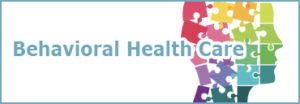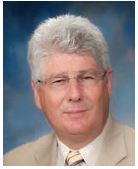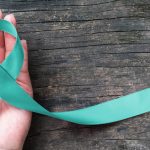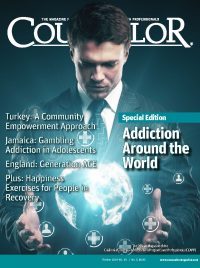Share
 In my last column, I discussed the progress made in the past several years addressing the opioid epidemic and other substance use disorders (SUDs). Improvements noted include reductions in prescription opioids and drug misuse, less heroin use among young people, wider distribution of naloxone kits to reduce drug overdose deaths, and a modest reduction in overdose deaths after several years of increasing deaths. I also reported an increase in medical practitioners trained and certified to provide medications for patients with opioid addiction seen in hospitals, emergency departments, or community clinics; quicker and easier access to treatment via “warm handoffs”; and more use of peers in recovery who function as paid professionals or volunteers. More individuals with opioid addiction are now engaging in treatment as a result.
In my last column, I discussed the progress made in the past several years addressing the opioid epidemic and other substance use disorders (SUDs). Improvements noted include reductions in prescription opioids and drug misuse, less heroin use among young people, wider distribution of naloxone kits to reduce drug overdose deaths, and a modest reduction in overdose deaths after several years of increasing deaths. I also reported an increase in medical practitioners trained and certified to provide medications for patients with opioid addiction seen in hospitals, emergency departments, or community clinics; quicker and easier access to treatment via “warm handoffs”; and more use of peers in recovery who function as paid professionals or volunteers. More individuals with opioid addiction are now engaging in treatment as a result.
Additionally, I discussed the adverse impact of SUDs on families members, including children, noting that there is limited attention paid to families and children in conferences, educational programs, and publications addressing the opioid epidemic or other SUDs. I stated that we need to do a better job incorporating the family perspective in our clinical, educational, advocacy, and research initiatives, and shared how my colleagues and I have increased the focus on families by:
- Advocating for families in multiple SUD related projects and initiatives
- Eliciting family input in workgroups and educational activities
- Increasing education to clients, families, significant others, and professionals
- Establishing a learning collaborative with licensed addiction providers to increase and incentivize family involvement in treatment
- Facilitating new community support programs or services for families
- Disseminating information to tens of thousands of professionals, health plan members, individuals and families affected by SUDs, politicians, and community organizations (e.g., social service agencies, community-based recovery centers, and churches)
This column provides resources for families and practitioners interested in helping or supporting family members affected by SUDs. The idea for this column is based on several observations:
- Medical and mental health practitioners who encounter individuals or families affected by SUDs often lack knowledge of SUD- and family-related literature, services, or resources that can help families.
- Feedback from hundreds of participants in educational programs shows the value of learning about and gaining access to resources for families with SUD members.
- The impact of SUDs on family members’ and individuals’ treatment and recovery needs are seldom addressed in conferences or workgroups (e.g., a recent three-day conference advertisement had a description of twenty-three presentations, not one of which mentioned the family perspective).
- Many practitioners in licensed treatment programs for SUDs have limited knowledge, experience, and/or interest in addressing family issues. Practitioners believe addiction is a family disease and the family needs help and support, but they do not offer services for family members even when the individuals with the SUD are active in treatment.
Organizations
Following are mutual-aid and other organizations that provide information (e.g., fact sheets, articles, guides, research summaries), resource guides, support, training, advocacy, and/or services for families to help them engage their loved one in treatment, locate local or national treatment resources, and engage in their own recovery since family members are often harmed by loved ones’ SUDs. More details about these organizations can be found on their websites.
Addiction Policy Forum (www.addictionpolicy.org)
This nationwide, nonprofit forum engages in educational and advocacy initiatives to help individuals and families in crisis, improve treatment, promote prevention and early intervention, raise awareness, and promote education and advocacy. It includes an Addiction Resource Center for individuals or families who need help dealing with those family members with SUDs. A 24/7 helpline (833-301-4357) is available where family members or significant others can speak confidentially to counselors. Families may be connected to local or national treatment resources. This forum includes a “Provider” section with extensive information about SUDs, treatment, and a treatment locator for local or national programs.
Al-Anon (www.al-anon.org)
This is the most widely used mutual-aid program for family and friends affected by individuals with alcohol problems. It offers in-person and online meetings, educational and recovery resources, and a Twelve Step program of recovery for family members and/or significant others.
Alateen (www.al-anon-org/for-alateen)
This is a mutual-aid program for teens affected by a parent or other family member’s alcohol problem. It provides the same services as Al-Anon.
ARISE: A Relational Intervention Sequence for Engagement (www.arise-network.com)
The ARISE network provides information and services to help engage adolescents and adults with SUDs or mental health problems in treatment. Different levels of interventions are provided based on the need of the individuals and current problems experienced. ARISE reports high rates of success helping families and concerned others engage their loved ones in treatment for a SUD or mental health problem.
Community Reinforcement Approach and Family Training (www.robertjmyersphd.com/craft)
This provides information on how to engage family members with a SUDs in treatment, and how family member can help themselves. This is one of the first approaches that conveyed the idea that families could benefit from involvement in treatment or recovery even if their loved ones with the SUDs refuse help.
Faces and Voices of Recovery (www.facesandvoicesofrecovery.org)
This advocacy organization provides information and support to individuals or families affected by SUDs. Some offer on-site recovery services in the community (e.g., www.favorgreenville.org).
Facing Addiction with NCADD (www.facingaddiction.org)
This advocacy organization aims to increase access to SUD treatment, translate science to services, advocate for evidence-based policies, and promote long-term recovery. It merged with the National Council on Alcoholism (NCAD) to influence a public health response to the problem of addiction.
Families Anonymous (www.familiesanonymous.org)
This provides online meetings to help and support to family members and friends affected by loved ones’ SUDs or other behavioral-related problems.
Family Resource Centers (www.familyresourcectr.org/category/community)
These are community-based, family-centered programs that provide a broad range of resources, including substance abuse prevention, family counseling, and help for families to address young people’s substance use. Services offered may vary among different centers.
Nar-Anon (www.nar-anon.org)
This is similar to Al-Anon, but with a focus on helping family members and others affected by loved ones’ drug problem.
National Association of Children of Addiction (www.nacoa.org)
This provides education, training, and recovery resources for children and families affected by SUDs.
The Partnership for Drug-Free Kids (www.drugfree.org)
This organization aims to help families struggling with children’s substance use. It provides information, support, and guidance to parents or others concerned about young people’s substance use. They have a helpline that connects concerned family members with experts to discuss ways they may deal with their specific situation.
US Government Organizations
The following federal organizations provide educational, treatment, recovery, research, and/or other resources for families, affected individuals, and professionals on substance use, SUDs, other related problems, the impact of SUDs on families, and help for families harmed by loved ones’ SUDs:
- National Institute on Alcohol Abuse and Alcoholism (NIAAA): niaa.nih.gov
- National Institute on Drug Abuse (NIDA): nida.nih.gov
- Substance Abuse and Mental Health Services Administration (SAMHSA): samhsa.gov. In addition to providing information, SAMHSA provides a 24/7, free, and confidential helpline (1-800-662-4357) for families in need of a treatment referral for a SUD or mental health problem; and a hotline for individuals in distress who are suicidal (1-800-273-8255). The Center for Substance Abuse Treatment, the Center for Substance Abuse Prevention, and the Center for Mental Health Services are part of SAMHSA.
William White (www.williamwhitepapers.com)
This is one of the most comprehensive websites on SUDs. It provides access to an extensive library of research and clinical materials for professionals, and information for individuals or family members affected by SUDs. Numerous articles and blogs focus on family issues, including a recent article entitled “Recovery Contagion Within the Family” (2019).
Publications
The following are brief descriptions of a few publications that provide insight on SUDs and recovery for the family.
Al-Anon Family Group Headquarters 2018 Membership Survey (2018)
This triannual survey presents data from 13,395 members who completed a questionnaire about their Al-Anon participation, and the benefits they experienced over the long-term. It provides information about their SUD member (50 percent also have a history of drug use in addition to an alcohol problem); their children (31 percent have an alcohol problem and they are at higher risk for a drug problem compared to their parents); generational trends in alcohol problems (70 percent of families have been affected by two or more generations with alcohol problems); rates of mental health disorders (29 percent have been diagnosed with a disorder); and improvements based on their years of Al-Anon membership (improvement in mental health, daily life at home, and functioning at work).
Family to Family Recovery Resource Guide (2017)
This comprehensive, educational, and hopeful resource guide is for families not yet in recovery, families in recovery, and those who have lost loved ones due to addiction. It provides information about addiction, treatment, and recovery for the SUD member. Care and recovery for the family are stressed with tips on coping and resources for family members. This is one of the best resource guides I have reviewed.
The Ripple Effect: The Impact of the Opioid Epidemic on Children and Families (2019)
If you Google the title of this report, you will have access to numerous websites that provide a file of this report, a summary of it, or other information related to the impact of SUDs on children. This report is based on a two-day meeting of researchers, clinicians, and policymakers across the US during which the impact of addiction on families and children was discussed. This report stressed that little attention has been paid to the effects of the opioid crisis on children and adolescents, and that these children are at increased risk of SUDs. Four broad areas were recommended for action:
- Reduce stigma and misunderstanding of opioid use and treatment (e.g., provide educational programs on SUD and treatment; have affected individuals or family members share their stories of recovery)
- Make investing in a response a priority (e.g., integrate services for children and parents; increase family-based services; invest in programs that promote youth development)
- Ensure that government and community agencies work as a team (e.g., expand community-based forums to address gaps in helping families)
- Identify children at risk as early as possible (e.g., encourage schools to be trauma-informed and support caregivers in identifying and responding to trauma in children)
Understanding Recovery from a Family Perspective: A Survey of Life in Recovery for Families (2018)
This report reviews the adverse impact of SUDs on the family (physical health, mental health, financial health, quality of life) and differences experienced during the active phase of a SUD and when the affected family member is engaged in treatment. Positive changes by individuals with SUDs and family members are documented (e.g., reduced family violence, improved financial condition, reduce use of health care services, improved work performance, etc). It stresses that families in recovery have important things to share, but their voices are seldom heard. This report confirms the need to focus on families, and for affected family members to engage in their own recovery and enhance their coping skills.
Conclusion
There are many resources that focus on the needs of families and significant others affected by loved ones’ SUDs. The more we are aware of, and use these resources to help families, the more members will benefit from it. It is my belief that we all need to increase the time and attention directed at families affected by SUDs and provide options for education, support, involvement in treatment, and engagement in recovery.
References
- Al-Anon. (2018). Al-Anon family group headquarters 2018 membership survey: Results and longitudinal comparison. Retrieved from https://al-anon.org/pdf/2018MembershipSurvey.pdf
- Andersson, C., Best, B., Irving, J., Edwards, M., Banks, J., Mama-Rudd, A., & Hamer, R. (2018). Understanding recovery from a family perspective: A survey of life in recovery for families. Retrieved from http://shura.shu.ac.uk/18890/1/FinalReport_0149.pdf
- Brundage, S. C., & Levine, C. (2019). The ripple effect: The impact of the opioid epidemic on children and families. Retrieved from https://uhfnyc.org/media/filer_public/17/2c/172ca968-43aa-45f9-a290-50018e85a9d8/uhf-opioids-20190315.pdf
- Friends of Recovery. (2017). Family to family recovery resource guide. Retrieved from https://preventioncouncilputnam.org/wp-content/uploads/2017/07/Family_to_Family_Resource_Guide.pdf
About Me
Dennis C. Daley, PhD, served many roles at the University of Pittsburgh School of Medicine. He is the author of many articles, treatment manuals, books, and guides for families and children affected by addiction. He helped facilitate B2H programs at two hospitals.












 Counselor Magazine is the official publication of the California Association of Addiction Programs and Professionals (CCAPP). Counselor offers online continuing education, article archives, subscription deals, and article submission guidelines. It has been serving the addiction field for more than thirty years.
Counselor Magazine is the official publication of the California Association of Addiction Programs and Professionals (CCAPP). Counselor offers online continuing education, article archives, subscription deals, and article submission guidelines. It has been serving the addiction field for more than thirty years.